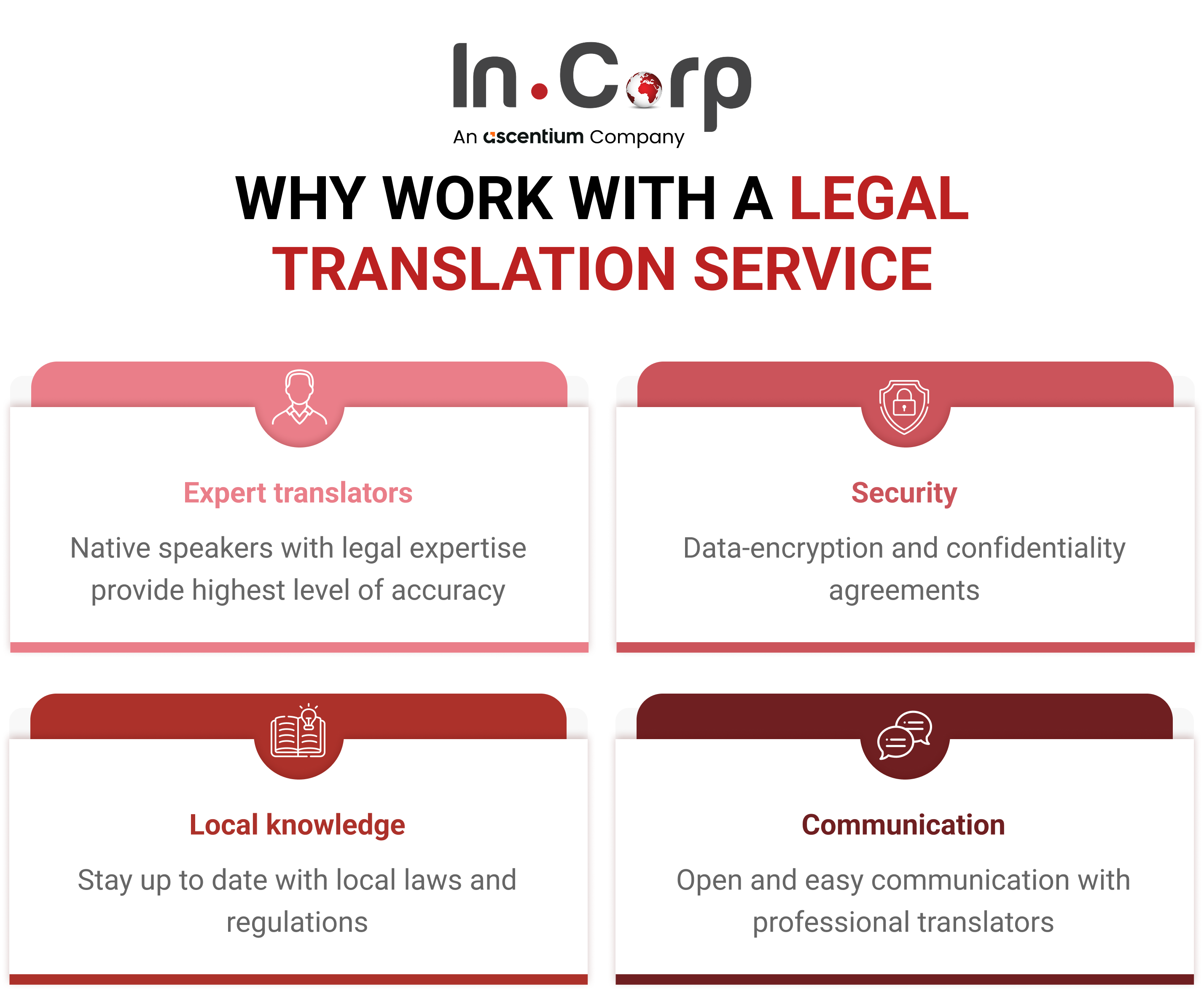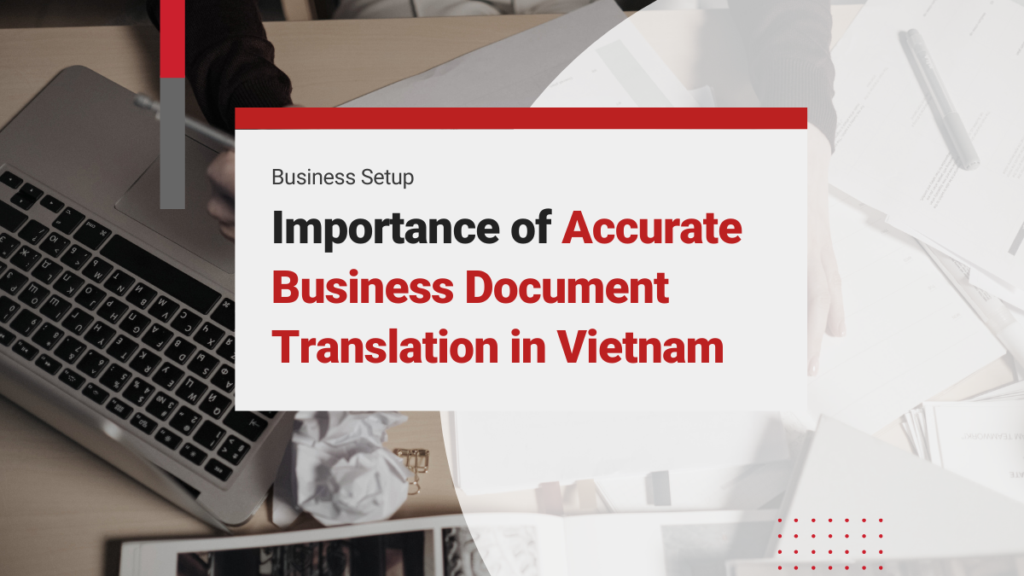Business document translation goes beyond words – it ensures the accuracy of your message, safeguards your interests, and maintains clarity across borders. A single mistranslated sentence can transform a thriving business into a costly legal issue, making professional translation essential for any serious international enterprise. For businesses operating in Vietnam, working with legal advisory experts can ensure that translated documents fully comply with local regulations and maintain their intended legal impact.
In this blog, we have covered all the ins and outs of precise business document translation in Vietnam, where regulatory frameworks are continually shifting.
What is Business Document Translation and When Will Investors Need It?
Business document translation is a specialized process that involves converting corporate documents from one language to another while ensuring accuracy, context, and cultural relevance. This applies to various materials, including contracts, financial statements, human resource policies, and legal documents translation such as agreements and regulatory filings. In Vietnam, investors require business document translation services for several key reasons:
Read Related: Business Process Outsourcing (BPO) in Vietnam: Key Contracts and Agreements
Human Resources Documents & Internal Communications
Employee Handbooks
When a company has a diverse workforce from different countries, providing employee handbooks in multiple languages is essential. Accurate business document translation ensures that all employees clearly understand company policies, benefits, and regulations. This prevents confusion, ensures compliance, and fosters a more inclusive workplace. Proper legal documents translation also helps legalize documents, aligning with local labor laws.
Read Related: Vietnam’s Workforce: High Demand Skills and Advice for Business
Training Manuals
For teams to collaborate effectively, they must fully understand their training. When companies employ a multilingual workforce, accurate business document translation of training materials is essential. Clear legal documents translation ensures consistency in learning and job responsibilities. Well-translated manuals help teams work seamlessly, regardless of language barriers, and support compliance with workplace regulations.
External Reports
Annual Reports
These critical documents reflect a company’s financial health and must be accurately translated. Precise business document translation ensures that investors can confidently assess financial data, make informed decisions, and understand the company’s performance, stability, and future plans. High-quality legal documents translation also helps legalize documents, ensuring compliance with international financial regulations.
Investor Communications
Investor communications ensure that stakeholders stay informed about company developments. Accurate business document translation is essential, as investors rely on clear updates about their investments, company changes, and future plans. High-quality legal documents translation enhances transparency, builds trust, and reinforces investor confidence in the company’s stability and growth.
Corporate Social Responsibility (CSR) Reports
These reports highlight a company’s social and environmental contributions. Accurate business document translation ensures a global audience understands its efforts in community support, environmental protection, and ethical business practices. High-quality translation enhances transparency, reinforcing the company’s commitment to corporate responsibility beyond financial performance.
Product Documentation
User Manuals
These guides help users operate products correctly. Clear and simple business document translation is essential, as no one wants to struggle with complicated instructions. Accurate legal documents translation ensures that users, regardless of language, can easily understand setup, usage, and troubleshooting, enhancing customer experience and product safety.
Product Descriptions
These documents must be translated accurately, as they explain a product’s features and benefits. Effective business document translation ensures the original tone and style are preserved while making sense in other languages. High-quality legal documents translation maintains clarity and consistency, helping businesses communicate their message effectively across global markets.
Safety Guidelines
These are very important because they keep people safe when using products. The translation must be clear and simple. There should be no room for confusion when it comes to safety
White Papers
These detailed documents showcase a company’s expertise and share valuable knowledge globally. Accurate business document translation ensures clarity and credibility, helping companies establish their reputation in international markets. High-quality legal documents translation maintains professionalism and consistency, demonstrating authority in their field across different languages.
Need assistance with business document translation and legal documents in Vietnam? Explore the expert Legal Advisory Services from InCorp Vietnam today!
The Importance of Accurate Business Documents Translation in Vietnam
Vietnamese culture and law are deeply intertwined, evolving alongside each other. As legal language adapts to cultural shifts, business document translation must go beyond literal word-for-word conversion. Instead, legal documents need careful adaptation to ensure clarity, accuracy, and compliance with Vietnamese regulations.
Read Related: How to Succeed in Business Culture in Vietnam: Negotiation and Gifts Giving
One major challenge in business document translation is that some legal terms in Vietnamese have no direct English equivalents. The Vietnamese government often creates terminology unique to its legal system, making professional translation crucial. Skilled translators ensure that these terms are accurately conveyed in both languages while maintaining legal integrity.
Mistranslation can lead to serious consequences. Poor business document translation can result in miscommunication between companies, damaging trust and business relationships. In extreme cases, errors in legal documents translation may even affect international relations or pose security risks.
For translators asking, “How much should I charge for translating a document?”, pricing depends on factors such as document complexity, language pair, and specialization. Given the precision required, business document translation—especially in legal contexts—often commands higher rates than general translation services.
Business Document Translation for Marketing and Partnership in Vietnam
Vietnamese is spoken by over 80 million people worldwide, including in Vietnam, Thailand, Cambodia, and China. This linguistic community is a big market for businesses. By having Vietnamese content, businesses can not only comply with Vietnamese laws and regulations but also target and engage with this bigger audience. This includes:
- Better customer experience: Providing information and support in the customer’s native language builds trust and stronger relationships.
- More brand awareness: Vietnamese content reaches a bigger audience and builds brand among diverse sections.
- Better marketing results: Localized content resonates more with the target audience, higher engagement rates, and better campaign performance.
- Competitive edge: Having Vietnamese content differentiates businesses from competitors who don’t cater to this market segment.
7 Essential Tips on How to Translate Legal Documents Effectively
Structure and Context
The structure is the foundation of business document translation, especially for legal documents. Maintaining headings, subheadings, and numbering is crucial to preserving clarity and legal validity. A precise legal documents translation ensures the document’s purpose and context remain intact, reaching the right audience effectively.
Get Legal Input
Seeking legal advice ensures that business document translation remains accurate and legally sound. Always choose a translator with expertise in legal documents translation and a strong understanding of legal terminology to maintain authenticity and compliance.
Know Legal Terms and Rules
To avoid any misinterpretation, learning the legal terms and rules is important. This can happen by using legal dictionaries, glossaries, and online resources. This will also help in understanding the legal framework in both languages.
Use and Audience
The translated documents should have a targeted audience and the use should be specified as well. When the purpose is clear, it is easier to set the tone and style of translation. For example, a legal contract for internal use requires a formal and technical tone, while a public announcement requires a simple and concise style. Being clear about the target audience will help in understanding the document and it will convey the message in a precise manner.
Total Confidentiality
Legal documents contain sensitive and confidential information which is why it is important to have total confidentiality while the translation process is going on. This can be done by incorporating strong data security measures like encryption, access control, and secure data storage. All parties should sign non-disclosure agreements (NDAs) to protect the sensitive information.
Be Accurate
Accuracy is very important while translating the document. To maintain the accuracy a detailed review including proofreading and quality assurance by legal professionals are must. The goal is to avoid mistakes and ensure the translated document conveys the legal meaning and intent of the original document.
Work with Native Linguists
It is crucial to work with fluent, native-language translator experts who have in-depth knowledge of both languages and cultures. They should not only be technically fluent but also have a strong legal and cultural background. They need to stay current with legal and linguistic developments. Working with these experts will ensure that the translations are accurate, and meet legal and cultural nuances.

The Challenges of Business Document Translation and Legal Documents
Legal document translation has its own set of challenges. These challenges come from the complexity of legal language, the differences between legal systems, and the dynamic nature of legal frameworks.
1. Differences in Legal Systems
Every country has its own unique set of laws and regulations, as well as legal principles. What is important in one country may not even exist in another, or may have a completely different meaning. A great example of this is the concept of “consideration” in English contract law. Consideration is the bargaining element, in other words, people exchange something of value. This concept does not directly exist in civil law systems, where the intention of the parties is what creates legal obligations.
2. Changing Legal Systems
Laws and regulations are always changing, with frequent updates and amendments. This means legal translators need to keep learning to stay updated and ensure their translations are accurate.
3. Legalese
The language used in legal documents is often called “legalese.” Even native English speakers are sometimes confused by words like “indemnify,” “obligate,” and “therefore.”
Adding to the challenge is “wooden language,” vague phrases that convey big ideas, such as “it is hereby agreed.”
A good example of wooden language is “to the best of my knowledge and belief.” In most cases, you can simplify this by what you would normally use: “true.” Another example is “time is of the essence.” This is not a phrase to be taken literally; it means that time does matter and will be a significant factor in your situation.
4. False Friends
Language has many traps for the unwary. One of the most common is the “false friend” – a word that is similar in both languages but has a very different meaning. The English word “pain” is a good example. We use it to describe hurt or suffering, while in French it means bread.
Disparities like this are why translations by machine are unreliable and why legal documents need to be translated by people with a deep understanding of the law in both countries. A lawyer translator should be fluent in both languages, familiar with the law in both countries and able to navigate the nuances of two different legal systems.
Read Related: 10 Major Business Challenges Foreign Investors Face in Vietnam
Other Factors to Consider with the Translation and Legalization of Documents
Certification and Legalization
The accuracy and validity of legal documents are very important. The certification process varies from country to country. Some countries ask for sworn translators (those recognized by the courts), official translators, or translations certified by accredited translation companies. Others require notarization of the translated document.
Consult with legal document translation experts to know the specific certification requirements of the target country. So the translated document is admissible and recognized by the authorities.
Types of Legal Documents Which Can Be Translated
It is very important to translate your legal documents and the need to translate them arises at every point of life, be it the moment of birth or registering for marriage to get the marriage certificates, all these documents need to be translated well. Here are some of the legal documents that are translated by the professionals:

How InCorp Vietnam Can Help?
Business document translations are very important which is why legal translators should have expert knowledge of the legal framework, terminology, and multiple languages to maintain accuracy. To eliminate the chances of mistakes, InCorp Vietnam will help you with professional translation by providing business document translation services. We will provide you with the accurate translation of your documents which will comply with all the legal requirements so that you can run your business smoothly.

clients worldwide

professional staff

incorporated entities in 10 years

compliance transactions yearly
Learn the Right Setup for Business
Expansion in the Vietnam
Frequently Asked Questions
How much should I pay someone to translate a document?
- Translation costs in Vietnam typically range from VND 100,000 to 300,000 per standard page (about 250 words), depending on the language pair, subject complexity, and urgency. Professional translation agencies may charge more for certified translations or specialized technical/legal documents.
How To Choose Vietnamese Translation Provider
- Choose a Vietnamese translation provider with native-speaking translators, industry-specific expertise, and a proven track record. Check client reviews, certifications, and sample work to ensure quality and reliability.
How to get a document professionally translated?
- To get a document professionally translated, contact a licensed translation company or a certified translator in the relevant language pair. In Vietnam, for official use, translations often need to be certified and notarized at a local notary office or through an authorized translation service recognized by the authorities. Make sure to provide clear copies of the original documents. Fees and processing times may vary depending on the document type and language.
How To Translate Legal Documents
- To translate legal documents, use a certified legal translator fluent in both the source and target languages. Ensure they understand legal terminology and the legal systems involved. Review the translation for accuracy and compliance with legal standards.






